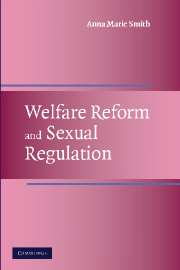Book contents
- Frontmatter
- Contents
- Acknowledgments
- Introduction
- 1 From Paternafare to Marriage Promotion: Sexual Regulation and Welfare Reform
- 2 Biopower and Sexual Regulation
- 3 Post-Foucauldian Sexual Regulation Theory
- 4 The Ideological Construction of Paternafare
- 5 Paternafare Law Today
- 6 Welfare Reform, Reproductive Heterosexuality, and Marriage
- 7 The Normative Assessment of Paternafare: An Ideal-Type Analysis
- 8 Feminist Visions
- Appendix I Gender, Race, and the TANF Population
- Appendix II Family Structure and Poverty
- Appendix III Child Support Enforcement Allocations in a Neoliberal Fiscal Environment
- Appendix IV The “Swarming” of Paternafare
- Appendix V The Disconnection between Poverty and TANF Assistance
- Appendix VI Race, Ethnicity, and the Family Cap
- Index
2 - Biopower and Sexual Regulation
Published online by Cambridge University Press: 05 June 2012
- Frontmatter
- Contents
- Acknowledgments
- Introduction
- 1 From Paternafare to Marriage Promotion: Sexual Regulation and Welfare Reform
- 2 Biopower and Sexual Regulation
- 3 Post-Foucauldian Sexual Regulation Theory
- 4 The Ideological Construction of Paternafare
- 5 Paternafare Law Today
- 6 Welfare Reform, Reproductive Heterosexuality, and Marriage
- 7 The Normative Assessment of Paternafare: An Ideal-Type Analysis
- 8 Feminist Visions
- Appendix I Gender, Race, and the TANF Population
- Appendix II Family Structure and Poverty
- Appendix III Child Support Enforcement Allocations in a Neoliberal Fiscal Environment
- Appendix IV The “Swarming” of Paternafare
- Appendix V The Disconnection between Poverty and TANF Assistance
- Appendix VI Race, Ethnicity, and the Family Cap
- Index
Summary
In a sense, paternafare resembles Foucault's modern prison. With high rates of recidivism, the modern prison is notoriously ineffective. But at the same time, it “swarms” outward to embrace contiguous populations within social control projects, and it models the latest official disciplinary technologies. The latter may be taken up by other institutions, such as the army, the factory, the hospital, or the school. The entire criminal justice system seizes upon the problematization of criminality and recidivism as an opportunity for rendering the otherwise impenetrable mass of ordinary residents into a systematically organized population, with the registration of countless individuals in databases and the transformation of “no-go” areas into highly policeable districts. Recidivism is not a fatal problem for the modern prison; it is the condition of possibility of legitimation discourse, social control technologies, and the advance of modern governance.
In the case of paternafare, the child support payments made by the payer are assigned, at first, to the state; these moneys are supposed to reimburse the state for the cost of the poverty benefits that have been paid to the custodial mother. At some point, the state stops paying TANF benefits to the welfare mother; she may leave the program when she finds work, she may be expelled for allegedly violating the incredibly burdensome program requirements, or she may reach her two-year time limit.
- Type
- Chapter
- Information
- Welfare Reform and Sexual Regulation , pp. 35 - 52Publisher: Cambridge University PressPrint publication year: 2007
- 2
- Cited by



